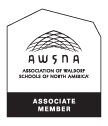The faculty and staff spent Monday engaged in conversations about their individual work and the school's. We considered two questions: 1) How can the school support your individual work? and 2) What is good and/or worthy of admiration in our school? There were a multitude of fine and interesting answers to both questions.
Responses to the first question will form the basis of ongoing work with each individual staff member to help their professional growth and the development of new capacities. Answers to the second question will be shared with the new marketing and communications committee, which is busy both improving the ways we work with current families and how we outreach to prospective families and help bring more new students to the school.
And I was inspired by answers I heard to that second question, reminded about something Rudolf Steiner addresses as of primary importance to anyone interested in a path of spiritual development. In the first chapter of How to Know Higher Worlds he says: “Our civilization is more inclined to criticize, judge and condemn than to feel devotion and selfless veneration…We must seek in all things around us, in all our experiences for what can arouse admiration and respect.”
I think Rudolf Steiner is on to something. I am not sure if it is in the nature of our brains or just our civilization and the way most of us were raised, but finding fault with things is fairly easy. I may even have a talent for it! I don't have to think very hard about what I don't like or what irritates me or what I think needs improving in my life, my relationships, our school, or our world. Those thoughts seem to pop in my head like popcorn!
When I began reversing this habit and looking at myself and others to see what was worthy of admiration and respect I started becoming a better person. Applying it to teaching writing to students was like a magic elixir. I found that if I worked initially to see what was good in their writing and reflect that to them, they had an easier time improving than if I told them only what needed fixing. They improved dramatically as writers and I as a teacher. And since then, I have had a daily practice in my personal and professional life of noticing what arouses admiration and respect in the worlds I inhabit. This is not always easy. It sometimes requires me to be saintlike and subdue many opinions. If I make a significant mistake I want to beat myself up. If there is something obviously disruptive, like a playground torn up by work on a drainage system, I am prone to find fault.
But here we all are together, working pretty hard to be good partners, parents, children, employees, bosses, human beings. There is a grace to be found in noticing what is good, what is working, what is admirable. My years in the classroom have shown me that it can actually save lives. Seeking to see the good in people, situations, and organizations helps them have momentum to learn and grow. It provides a resource for the work that must be done. Steiner goes on to say that when we criticize, we diminish our strength, and when we see what is of value we grow in capacities. Most of us our not ready to be canonized yet, but a little 'yoga' of positivity can improve our own lives and those around us. Mark Twain said: "I can live for two months on a good compliment." May we all give one another somewhat more frequent nourishment!
—Edited from Deborah’s head of school newsletter column, October 8, 2019









